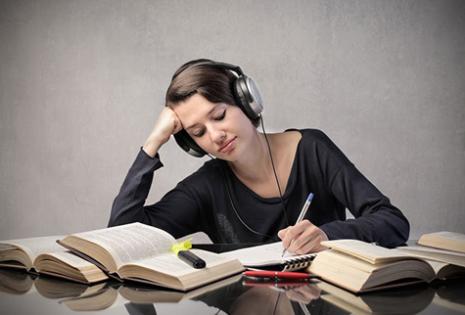According to a leading psychologist, music can help students think and feel better during the 'terror time' of exams.
"What determines whether music helps or hinders studying is how much physiological arousal it produces," according to Professor Adrian North of Curtin University.
"As music gets louder, faster or more raucous it creates more arousal: think hard rock, heavy dance beats and machine-gun rapping styles.
"Similarly, if the music is unfamiliar to you, then your brain has to devote more processing resource to listening to it. This reduces the amount of attention you can pay to the books," Professor North states.
"Conversely, music is less arousing if it is slow, smooth and steady, and it also places a lower demands on your brain if you know it well already."
The extent to which this influences a student's ability to study depends on the nature of what they're doing.
"If the material is difficult or requires close attention to detail, give music a miss," advises Professor North.
"Any music you hear will reduce the processing capacity available to your brain to deal with your school work, make it difficult for you to concentrate and lead to errors. The more arousing the music, the more detrimental the effect."
But he says that if what you're trying to learn or remember is repetitive or boring, then listening to arousing music could actually help.
Professor North says that preparing for exams is an emotional time and this is another area where music can help.
"Everyone needs down time and so you can of course listen to music to have some fun or get rid of some frustration at the end of the day."
He believes that music can also help students on the day of the exam.
Professor North says that research carried out in dentists’ waiting rooms shows the dramatic effect that music can have in alleviating anxiety about imminent nerve-wracking events.
"It reduces levels of the stress hormone cortisol and lets you go into the exam itself with a clearer head: if you’re super-nervous, then listen to some low arousal music and focus on the music itself in order to distract yourself. If instead you’re coming to the exam on the back of a sleepless night, then listen to some arousing music to wake yourself up.
"We also know that you will more effectively recall the material you have been revising if you can simulate the context in which you learned it initially.
"If sutdents listened to a lot to a particular artist while they were revising, then listen to them again immediately outside the exam hall."
And what are his tips to help students get through exams?
- Make study playlists.
- Prepare the playlists now and turn shuffle on to minimise distraction.
- If using Spotify, iTunes Radio or something similar, set the preferences for only a low level of discovery and turn off Facebook notifications.
- If a boost is needed, then turn up the level of discovery - but remember: keep Facebook turned off!



















__small.png)










